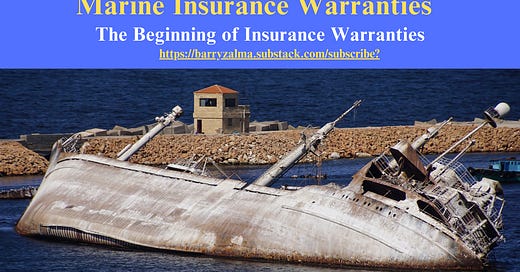Marine insurers invented the warranty in an insurance policy. So, it is fitting that a boat was involved in Lloyd’s of London v. Pagan-Sanchez, 539 F.3d 19 (1st Cir. 2008), in which the First Circuit Court of Appeal enforced a warranty and deprived the insured of all rights to indemnity because of the breach of warranty.
The case arose in 2003. A vessel called the Gabriella was at sea when an exhaust hose came loose and the Gabriella began taking on water through its exhaust system. Attempts to pump out the water were unsuccessful, and the Gabriella flooded and sank. The insured later submitted a claim to the plaintiffs for $175,000 for the loss of the boat and $100,000 for the costs incurred during salvage operations.
The insurers found by investigation that the loss of the Gabriella was caused by wear and tear, gradual deterioration, and lack of maintenance, and they also found that the vessel’s fire extinguishing equipment had not been inspected or certified within the preceding year and that the automatic engine room fire extinguisher system had been disconnected prior to the loss. Both were warranted by the insured to be in effect.
Even though there was no relationship between the terms of the warranty and the actual cause of the loss, the First Circuit concluded that “under the federal rule and the law of most states, warranties in maritime insurance contracts must be strictly complied with, even if they are collateral to the primary risk that is the subject of the contract, if the insured is to recover.”
In Lexington Ins. Co. v. Cooke’s Seafood, 835 F.2d 1364, 1366 (11th Cir. 1988), admiralty law requires the strict construction of express warranties in marine insurance contracts and that breach of the express warranty by the insured releases the insurance company from liability even if compliance with the warranty would not have avoided the loss. [Travelers Prop. Cas. Co. of Am. v. Ocean Reef Charters LLC (11th Cir. 2021)] In addition, “in marine insurance, there is historically no requirement that the breach of warranty relate to the loss, so that any breach bars recovery even though a loss would have happened had the warranty been carried out to the letter.” The treatise noted that most courts agree that in a maritime insurance contract, “[i]f the warranty is breached, the insurer is discharged.”
New York law has long provided that “the breach of an express warranty [in a marine insurance policy], whether material to the risk or not, whether a loss happens through the breach or not, absolutely determines the policy and the assured forfeits his rights under it.” Cogswell v. Chubb, 1 A.D. 93, 36 N.Y.S. 1076, 1077 (1st Dept.1896) (navigation limit warranty), aff’d, 157 N.Y. 709, 53 N.E. 1124 (1899).
As New York’s Court of Appeals has explained, an express warranty in a marine insurance policy “must be literally complied with, and that noncompliance forbids recovery, regardless of whether the omission had a causal relation to the loss.” [Jarvis Towing & Transp. Corp. v. Aetna Ins. Co., 298 N.Y. 280, 82 N.E.2d 577, 577 (1948) and Levine v. Aetna Ins. Co., 139 F.2d 217, 218 (2d Cir.1943); Kron v. Hanover Fire Ins. Co., 15 N.Y.2d 521, 254 N.Y.S.2d 119, 202 N.E.2d 563-64 (1964) all of which required literal compliance rule to bar coverage where insured breached a warranty. [Great Lakes Ins. SE v. Aarvik (S.D. Fla., 2019)]





